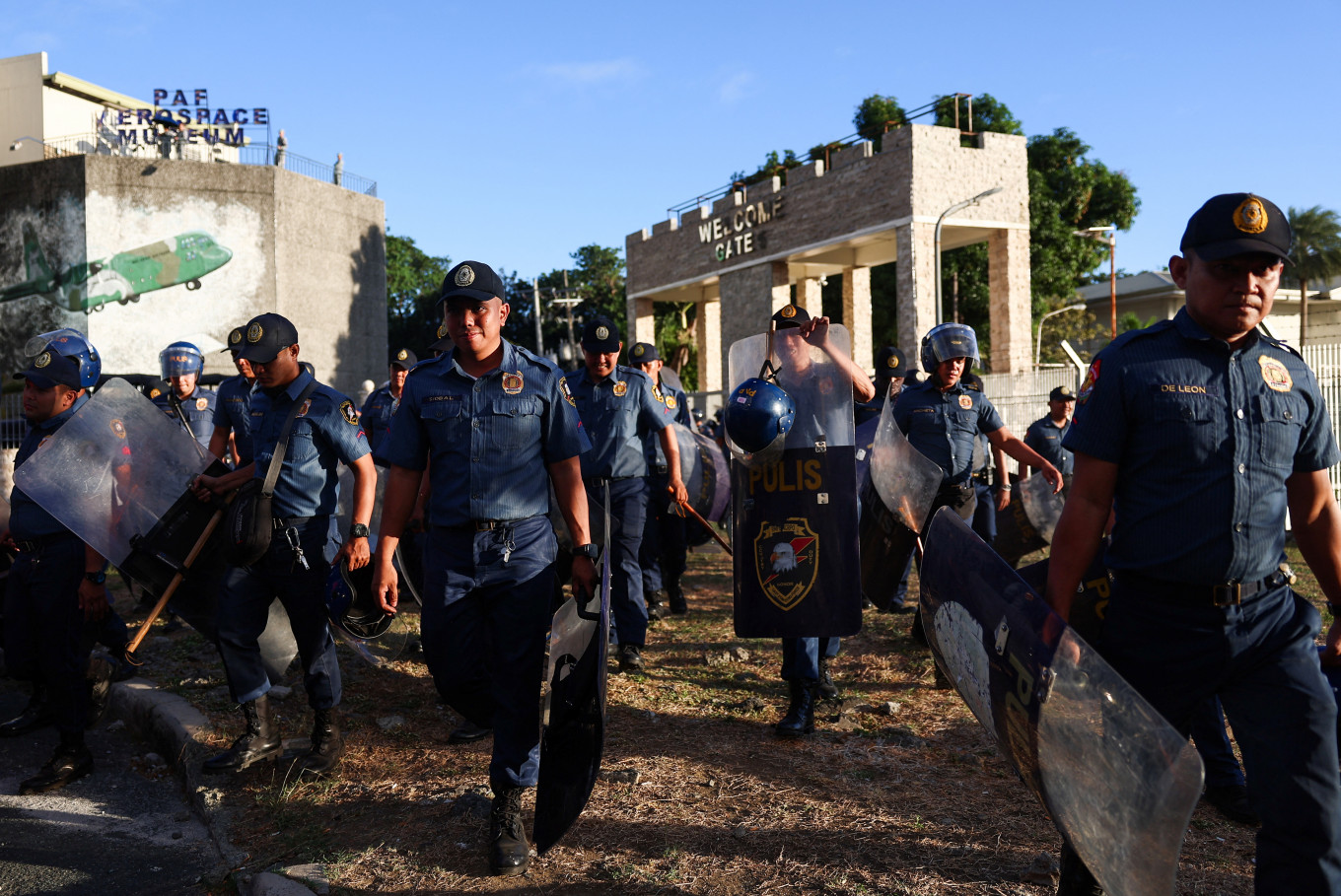Popular Reads
Top Results
Can't find what you're looking for?
View all search resultsPopular Reads
Top Results
Can't find what you're looking for?
View all search resultsBreaking impunity: Duterte’s arrest and new chapter in Southeast Asian Justice
More than a symbolic act, Duterte’s arrest signals the beginning of a new era in which no leader, regardless of domestic popularity or political influence, can evade accountability.
Change text size
Gift Premium Articles
to Anyone
T
he arrest of former president Rodrigo Duterte on Tuesday, carried out under an International Criminal Court (ICC) warrant, marks a watershed moment in the struggle for justice in the Philippines and Southeast Asia in general.
Duterte’s detention upon his arrival at Manila’s airport is indeed a historic event, regardless of the internal power struggle in the country. It marked the culmination of tireless efforts by lawyers, human rights defenders and civil society activists who had long fought to expose a regime mired in grave human rights abuses.
More than a symbolic act, Duterte’s arrest signals the beginning of a new era in which no leader, regardless of domestic popularity or political influence, can evade accountability.
Central to this development is the ICC’s investigation into Duterte’s violent crackdown on illegal drugs, a campaign that claimed an estimated 12,000 to 30,000 lives, mostly among the nation’s most vulnerable communities.
The brutality of this “war on drugs” has laid bare the true cost of policies that were justified by Duterte’s administration as essential for restoring law and order. Yet, in practice, these extra-judicial killings dismantled democratic institutions and silenced dissent, leaving behind a legacy of shattered families and eroded civil liberties.
Duterte’s calculated maneuvers to insulate himself from international accountability further underscore the gravity of his actions. Notably, he engineered the Philippines’ withdrawal from the Rome Statute, the treaty that established the ICC, aiming to shield his government from scrutiny.
Despite this strategic retreat, the ICC retained jurisdiction over crimes committed during the country’s tenure as a state party, covering the period from November 2011 to March 2019. In September 2021, a pretrial chamber formally launched an investigation into the “war on drugs” after receiving more than 200 victim representations, ensuring that the voices of the marginalized and the disenfranchised would not be lost amid political maneuvering.
For nearly a decade, Duterte’s policies cast an oppressive shadow over the Philippines. Since taking office in 2016, his regime unleashed a reign of terror under the guise of combating drugs. In a country once proud to have played an active role in shaping the international legal order and enacting robust domestic legislation for accountability, the government’s decision in March 2018 to withdraw from the Rome Statute sent a stark, chilling message about its waning commitment to justice.
The execution of the ICC arrest warrant sends an unequivocal message to the world: No leader is above the law. This development is particularly significant in Asia, where instances of international accountability are rare.
Should Duterte be transferred to The Hague, he would become the first former head of state from Southeast Asia to stand trial before the ICC, a historic precedent that challenges longstanding norms of impunity and reaffirms the global commitment to justice and human rights.
Critics argue that the ICC’s intervention infringes upon Philippine sovereignty, insisting that criminal allegations should be resolved within national courts. Prominent figures from Duterte’s camp decry the arrest as external interference in domestic affairs.
However, such arguments fail to confront a fundamental truth: The victims of the “war on drugs”, the disenfranchised and the voiceless, deserve justice that transcends political expediency.
Domestic courts, weakened by institutional shortcomings and political pressures, have repeatedly failed to deliver the accountability these victims urgently require. In this context, the role of international mechanisms like the ICC is not merely complementary but essential, a vital check on state power and a guardian of fundamental human rights.
This landmark case compels us to reexamine the broader implications for ASEAN and the international community. For ASEAN, Duterte’s arrest is not an isolated legal event but a call to redefine regional principles of sovereignty, accountability and human rights.
The bloc, traditionally guided by norms of noninterference, must now embrace a more proactive stance. By fostering robust cooperation between domestic institutions and international mechanisms like the ICC, ASEAN can set a precedent for accountability that resonates well beyond its borders.
At its core, this case is not merely a legal matter, it is a profound assertion that human dignity must prevail over political expediency. The international community must reject narrow interests that compromise justice and instead commit collectively to upholding the rights of those most affected by state violence.
Such a stance honors the marginalized while paving the way for a future where power is exercised responsibly and transparently.
For ASEAN, this requires moving beyond its traditional focus on noninterference and taking a proactive role in defending human rights and promoting democratic values. Although the struggle for human rights in Southeast Asia is far from over, decisive actions like Duterte’s arrest illuminate a clear path toward a more just and accountable society.
Only Cambodia and Malaysia are parties to the Rome Statute among the 10 ASEAN member states. However, the regional bloc must strengthen the rule of law, enhance judicial independence and build resilient systems of accountability. Only by doing so can we prevent the recurrence of past atrocities and ensure that power is exercised for the benefit of all citizens.
At this critical juncture, let us resolve to forge a future where justice is never compromised by political expediency, where the voices of victims are truly prioritized and where the rule of law remains inviolable.
***
The writer is executive director of ASEAN Parliamentarians for Human Rights.











